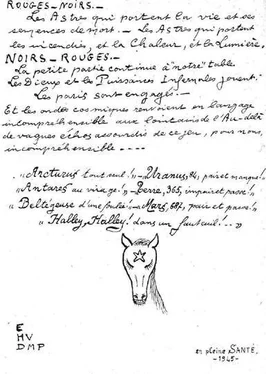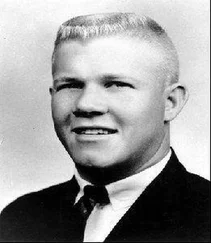One former classmate, Jean Delanove, remembered how Petiot sometimes took a gun to school, showing it off to other children on the playground and pointing it at stray cats. Petiot was eventually expelled for bringing the weapon into the classroom and then, in the middle of a lecture, firing it into the ceiling.
Athanise Berthelot, a teacher at Auxerre who knew Petiot between the ages of thirteen and sixteen, summed him up as “intelligent, but not enjoying all his mental faculties. In a word, he was a bizarre character.” The assistant principal, Marcel Letrait, agreed. Petiot was smart, but when it came to his studies, he was “incapable of [making] a sustained application.”
At age seventeen, Petiot was arrested. In a crime that must have particularly angered his father, still a postal employee, Petiot was caught stealing mail with a contraption he made from a fishing pole with an adhesive at the end. He was believed to be looking for cash, money orders, or just salacious gossip, which he could spread in anonymous letters, perhaps even accompanied by threats of blackmail. The psychiatrist appointed to examine the young delinquent, as required by French law, concluded that Petiot suffered from hereditary mental illness. Petiot’s father protested that that was not possible.
Young Petiot seemed to crave attention. As he later said, he had felt abandoned by his parents. When his mother died, his father, grieving, shut himself off further from his two boys. Marcel Petiot would say that he believed that he had been conceived by mistake, and his birth had probably been illegitimate. In any case, he had felt lonely, rejected, and unloved. His first known close relationship was with his younger brother, Maurice. The Petiot brothers would, for the most part, remain close their entire lives.
AFTER a few more unsuccessful stints in school, with probably additional expulsions at Joigny and Dijon, Petiot received his secondary school diploma (Bachot d’Enseignement Secondaire) on July 10, 1915, by studying at home in Auxerre with his uncle, Vidal Gaston, a mathematics teacher. By this time, with the First World War raging, Petiot had volunteered for the army, receiving the early enlistment number at Auxerre of 1097. On January 11, 1916, he began his military training at Sens, a tranquil village with a cathedral designed by the architect William of Sens, better known for his supposed work on Canterbury Cathedral.
Ten months later, Petiot saw his first action, in the muddy, bloody, rat-infested trenches of the Western Front. This was the beginning of four grim months of aerial bombardments, artillery shellings, and vicious close-range fighting. All around young Petiot, in the Eighty-ninth Infantry Regiment, bodies were mangled, bones smashed, and entrails disgorged. The ghastly slaughter of the war of attrition was immense. The Parisian doctor Sumner Jackson, who drove an ambulance on the same battlefield as Petiot’s regiment, estimated that the French there lost one hundred men a minute. On May 20, 1917, in a trench at Craonne, along the Chemin des Dames, a strategic passageway to the Aisne, Petiot was wounded. A hand grenade tore an almost three-inch gash in his left foot.
This was a curious wound. A hand grenade, lobbed into a trench, would likely explode upward, not downward into his foot, and indeed, at least one soldier in his unit claimed that Petiot had wounded himself. According to this allegation, Petiot had placed a grenade into a pipe and then put his foot in front of its opening. Petiot adamantly denied this accusation, dismissing it as a malicious fabrication of a man who envied his education.
It was at this time that Petiot started to show pronounced signs of imbalance. Like many shell-shocked soldiers, a term that derives from the First World War, Petiot could not sleep or eat, and he suffered agonizing headaches and vertigo. He lost weight. He would tremble, or startle at the slightest noise. He also burst into fits of unrestrained crying and suffered bronchial complications, probably from an earlier poison-gas attack. The head of the medical team at the hospital in Orléans diagnosed Petiot as showing “mental disequilibrium, neurasthenia, depression, melancholia, obsessions, and phobias.”
Over the last twenty-four months of the war, Petiot was shuffled between medical clinics, army barracks, mental asylums, and even a military jail for theft. He was accused of stealing blankets, morphine, and other army supplies, as well as wallets, photographs, and letters. One soldier remembered encountering Petiot for the first time when he returned to his hut and found the smiling stranger stretched out on a nearby cot, reading a book by candlelight. The soldier recognized the book as his own, as was the candle. Petiot, showing no embarrassment, said only, “Here, what is yours is mine.” The soldier asked if that principle worked both ways and, receiving the answer that it did, went to rummage through Petiot’s haversack. He found only a miniature chess set.
After Petiot’s arrival, the unit began to enjoy an unaccustomed variety of dry sausages, cheeses, candy, wine, and other luxuries, no doubt obtained from daily and nightly foraging excursions. Petiot seemed to glow after each triumph. The soldier remembered one conversation about the morality of theft, Petiot arguing that it was completely natural. “How do you think that the great fortunes and colonies have been made? By theft, war, and conquest.” Then morality does not exist? No, Petiot answered, “it is the law of the jungle, always. Morality has been created for those who possess so that you do not retake the things gained from their own rapines.” Petiot would later claim that he learned a lot from war.
He would have one last stint (September 1918) in active duty, as a machine gunner with the Ninety-first Infantry Regiment at Charleville in the Ardennes. This was in the Second Battle of the Marne, and the Germans were coming as close to taking Paris as they had since the First Battle of the Marne four years before. But here, too, Petiot ran into trouble with authorities, and his panic attacks returned. The physician later claimed that he had faked mental illness to avoid combat and had used knowledge gained in the hospital’s library, particularly its medical journals, to embellish his performances. The doctors who diagnosed him, on the other hand, were convinced it was no act.
Petiot would be institutionalized in not one, but several different mental hospitals over the next three years, including Fleury-les-Aubrais, Bagnères, Évreux, and Rennes. Five months after the armistice, Petiot was still institutionalized in the psychiatric division of Rennes Military Hospital. He was diagnosed as suffering from “mental imbalance, along with sleepwalking, melancholia, and depression marked by a tendency towards ideas of persecution and suicide.” Petiot was discharged in July 1919 with a 40 percent disability pension, though in September 1920 he was given full disability. Examiners believed that Petiot was unable to work and required institutionalization with “continuous surveillance.” After later medical tests, his disability was reduced in March 1922 to 50 percent. This rate was confirmed again in July 1923.
In evaluating his mental health, army investigators had interviewed many family members. His grandmother, Jeannquin Constance Bourdon, told them that Petiot had always been a “delicate and nervous” child. He wet the bed and soiled his clothes until the age of ten or twelve. At night, he would not sleep, but always wanted to “go for a walk.” His uncle and teacher, Vidal Gaston, described him as “very intelligent and understands well,” but added, “what bizarre behavior.” No friends visited him, and Gaston had not seen him either since he helped him pass his exams. He said that he could “provide no information on his mental state.”
Читать дальше












